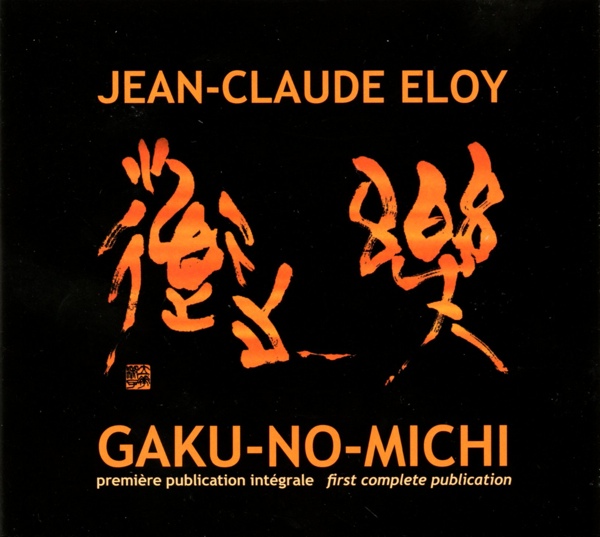
 |
|
 |
Format: 4 x CD Label & Cat.Number: Hors Territoires HT-01-2-3-4 Release Year: 2009 Note: re-issue of the great do-LP from 1979, produced in Tokyo 1977-1978, an epic work dealing with the "Tao of Music" with a total of 242 minutes, comparable to ROLAND KAYNs "Tektra", but it has also very subtle droning sounds and movements... - 10 panel digipak with 16 page booklet "...This is a massive sound, immersive all around, which is best enjoyed when played loud.. " [FdW / Vital Weekly] - BACK IN STOCK, NICE PRICE now !
Price (incl. 19% VAT): €32.00 Warning: Currently we do not have this album in stock!
More Info" “Gaku-no-michi”, Tao of music or Ways of music. Film without images for electronic and concrete sounds. Produced at the electronic music studio of NHK Radio, Tokyo 1977-78. Digitalized and revised version from 2006.“Jean-Claude Eloy is a French composer, born in 1938. He studied at the Paris National Superior Conservatory of Music, where he won First Prizes in Piano, Chamber Music, Counterpoint, Ondes Martenot, and studied composition with Darius Milhaud. He attended summer courses at Darmstadt (Pousseur, Scherchen, Messiaen, Boulez, Stockhausen) and was a student in composition in Pierre Boulez’ master class at the Music Academy in Basel (1961-1963). Works by Jean-Claude Eloy have been performed all over the world. They have been conducted by Pierre Boulez, Ernest Bour, Michael Guilen, Bruno Maderna, Diego Masson, Michel Tabachnik, Arthur Weisberg and others ... He has lived in the United States (professor at the University of California, Berkeley, in the sixties), Germany (invited by the WDR studios in Cologne, the Technische Universität in Berlin, guest artist at the Berliner Künstlerprogramm), Holland, Japan (where he collaborated with NHK and the National Theater of Japan, among other activities). He participates regularly in numerous international festivals, principally in Europe, but also in Asia, the United States, Canada and Latin America as sound-projectionist for his electro-acoustic works and with the soloists closely associated with his compositions : Fatima Miranda (vocalist), Yumi Nara (soprano), Michael Ranta (percussionist), Junko Ueda (Shōmyō singer and Satsuma-Biwa player), Kōshin Ebihara and Kōjun Arai (Buddhist monk singers), Mayumi Miyata (Shō player), etc.” CD 1: “Pachinko” introduces “Tokyo” in a deliberately stiff, regular, almost mechanical and untranscended way while the big spiral of long successive waves, which further develops through Tokyo, becomes more and more varied in its material ending in the surpassing and searched-for transubstantiation taking place throughout the final part. CD 2: The second disc, “Fushiki-e”, takes us (through varied, complex, contrasted and sometimes violent sound episodes) towards the four “stages of contemplation” including the last one, “Mokuso”, which represents the ultimate stage of the contemplative. It is the longest part of the whole piece, lasting almost 80 minutes. CD 3: “Banbutsu no Ryūdō” is a boundless continuous “weft” travelling so to say through all sorts of daily or exceptional « sound scenes » continually metamorphosing, going from political speeches to a Shishi Odoshi, transformed for a long time well before its pure, direct appearance. CD 4: “Kaiso “ is a moment of gravity innervated and built around the annual commemorative ceremony of Hiroshima, which however leads us beyond the evoked drama to a place of surpassing with peace through the « Han » sound, extending the work to infinity…” " [label info] "...This is a massive sound, immersive all around, which is best enjoyed when played loud. Not because the music is loud, but there are various passages, which are loud and they sound great when the volume is all up, and the softer parts bring out hidden sonorous qualities. I am not qualified to say whether this goes beyond the idea of strict composing - somehow it seems so: an endless stream of sounds and textures, rich in a poetic way, placed along side eachother, sometimes going on for quite a bit (the drone aspect I'd say), which might be against the golden rule book of composing, but who cares? This 4CD can only be compared with, I think, with the re-issue of Roland Kayn's 'Tektra', also a 4CD set and also by somebody whom we almost forgotten about - and probably we did again? Let's hope we don't do that with Eloy and that more of such great music will be released. Devoting an entire day to one composer may seem luxury, but who am I to 'complain'?" [FdW/Vital Weekly] |
| © 2007 Drone Records | | Celler Strasse 33, 28205 Bremen, Germany | Privacy and cookies policy | Impressum / Allgemeine Geschaftsbedingungen / Haftungsausschluss | Links to the scene |